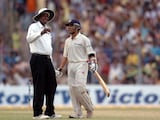- Cough syrup samples from Rajasthan and Madhya Pradesh lacked toxins causing kidney injuries, the Centre said
- Nine children in Chhindwara died after using Coldrif and Nextro-DS syrups and three died in Rajasthan
- The Health Ministry has now advised against cough syrups for children under five, and especially below two
Cough syrup samples linked to the deaths of children in Rajasthan and Madhya Pradesh did not contain toxins associated with kidney injuries, the Union Health Ministry said Friday.
Scientists from the National Centre for Disease Control, the National Institute of Virology, the Central Drugs Standard Control Organisation and other agencies visited Madhya Pradesh's Chhindwara and collected samples following reports children died after being fed the syrup.
Tests, though, showed none of the samples contained diethylene glycol or ethylene glycol. The samples were also tested by state officials to confirm the absence of the three contaminants.
The centre, however, issued an advisory to limit use of cough syrup for children. Specifically, the Director General of Health Services has said cough and cold medicines should not be prescribed to children younger than two and are generally not advisable for those below five.
The advisory said most cases of cough in children are self-limiting illnesses that improve without medicines, and that hydration, rest, and supportive care should be the first line of treatment. Manufacturers have been told to adhere to 'good manufacturing practices' and avoid multiple drug combinations, as well as sensitise parents on the safe use of medicines.
Alarm bells rang out after nine children died of kidney failure in Chhindwara in 15 days. Initial inquiries suggested the cough syrup had been laced with diethylene glycol, a toxic substance.
Kidney biopsies confirmed diethylene glycol in the children's bodies.
Most of the victims had been administered Coldrif and Nextro-DS syrups.
Chhindwara Collector Sheelendra Singh immediately banned the sale of the two syrups across the district and issued an urgent advisory to doctors, pharmacies, and parents.
Then came reports from Rajasthan linking three children's deaths to cough syrups.
The Health Ministry has clarified that syrup does not contain propylene glycol, which can sometimes be a source of diethylene or ethylene glycol contamination.
The syrup was a dextromethorphan-based formulation not recommended for children.
Samples from Rajasthan are currently being tested, and the company producing the syrup is also being scrutinised. The state government has ordered a 'thorough investigation' into all products of Kayson Pharma, which supplies the generic syrup distributed for free.
The controversy took a dramatic twist in Rajasthan after a senior doctor publicly consumed the syrup to prove its safety. He collapsed a few hours later; he was found unconscious in his car.
Now, 22 batches of the syrup have been banned.















